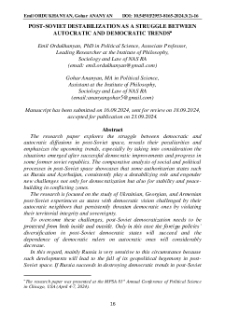Object
Title: Post-Soviet Destabilization as a Struggle between Autocratic and Democratic Trends
Publication Details:
Journal or Publication Title:
The Politnomos․ Journal of Political and Legal Studies
Date of publication:
Volume:
Number:
ISSN:
Coverage:
Abstract:
The research paper explores the struggle between democratic and autocratic diffusions in post-Soviet space, reveals their peculiarities and emphasizes the upcoming trends, especially by taking into consideration the situations emerged after successful democratic improvements and progress in some former soviet republics. The comparative analysis of social and political processes in post-Soviet space showcases that some authoritarian states such as Russia and Azerbaijan, consistently play a destabilizing role and engender new challenges not only for democratization but also for stability and peace-building in conflicting zones. The research is focused on the study of Ukrainian, Georgian, and Armenian post-Soviet experiences as states with democratic vision challenged by their autocratic neighbors that persistently threaten democratic ones by violating their territorial integrity and sovereignty. To overcome these challenges, post-Soviet democratization needs to be protected from both inside and outside. Only in this case the foreign policies’ diversification in post-Soviet democratic states will succeed and the dependence of democratic rulers on autocratic ones will considerably decrease. In this regard, mainly Russia is very sensitive to this circumstance because such developments will lead to the fall of its geopolitical hegemony in post-Soviet space. If Russia succeeds in destroying democratic trends in post-Soviet space, it will not only keep its influence over other countries but also push them back to the authoritarian rule.
Publisher:
Format:
Identifier:
click here to follow the link ; oai:arar.sci.am:378734
Language:
Object collections:
Last modified:
Oct 21, 2024
In our library since:
Oct 21, 2024
Number of object content hits:
164
All available object's versions:
https://arar.sci.am/publication/409938
Show description in RDF format:
Show description in OAI-PMH format:
-
The Politnomos․ Journal of Political and Legal Studies
-
The Politnomos․ Journal of Political and Legal Studies, 2023
-
The Politnomos․ Journal of Political and Legal Studies, 2024
-
The Politnomos․ Journal of Political and Legal Studies, 2024, vol. 3, 1
-
The Politnomos․ Journal of Political and Legal Studies, 2024, vol. 3, 2
- Cover; Editorial board
- Contents
- About the journal
- Formation and Development of the Armenian Lobbying Organizations in the USA: Historical Context
- Post-Soviet Destabilization as a Struggle between Autocratic and Democratic Trends
- Priorities of Political Communication in Armenia’s Internal Politics
- The Main Challenges of the Future European Union Enlargement
- The Problem of Typology of States and Legal Systems
- Judicial Review of Administrative Regulations: Constitutional Justice vs Administrative Justice
- Notes to Contributors
-
The Politnomos․ Journal of Political and Legal Studies, 2024, vol. 3, 1
-
The Politnomos․ Journal of Political and Legal Studies, 2025
-
The Politnomos․ Journal of Political and Legal Studies, 2023
| Edition name | Date |
|---|---|
| Ordukhanyan, Emil, Post-Soviet Destabilization as a Struggle between Autocratic and Democratic Trends | Oct 21, 2024 |





